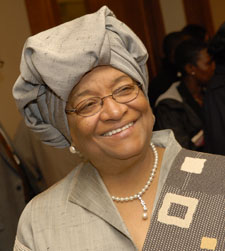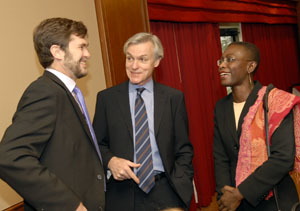
Liberian President Ellen Johnson Sirleaf described the achievements of her year-old government in recovering from a prolonged civil war and called upon the U.S. and other Liberian partners to drop the debt inherited from past governments, continue security assistance, and step up development assistance, especially road building.
"Slowly but steadily we are making our way back. We know we can create a new peaceful, open and prosperous Liberia," said Sirleaf, Africa’s first elected female head of state, at an event (video clips of Pres. Johnson Sirleaf and Rep. Jesse Jackson, Jr. are available on the event page) organized by CGD that marked the start of an official visit to Washington.
"We believe that Liberia can be an example…that war-torn dictatorships can turn around and become responsible members of the international community," she said. "We are willing and ready to make the hard decisions, to adopt the right policies, to put in the right systems, if you are willing to be with us and support us, politically, analytically, and financially."
While in Washington, Sirleaf will meet with representatives of Liberia’s international partners to describe its progress, outline its strategy, and discuss how the partners can support Liberia.
Sirleaf announced that CGD founder Edward Scott, Jr. would provide $1 million to assist Liberia in managing its reconstruction, by sponsoring five or six highly trained specialists each year for three years to work in key Liberian ministries to support senior officials and their staff (see press release). She also thanked CGD senior fellow Steve Radelet, who has been advising the Liberian government on its relations with the international donor community.

U.S. Congressman Jesse Jackson Jr. told the gathering that additional U.S. help is needed to ensure that plans for rebuilding the Liberian national army are fulfilled. All the outside assistance "will go for naught unless there is peace and stability," Jackson said.
CGD president Nancy Birdsall, who recently visited Liberia, praised Sirleaf's government for rapid progress in restoring order and rebuilding systems destroyed during the prolonged civil war. The Liberian government reports quarterly on revenues and expenditures, she said, but donor organizations working in Liberia have yet to provide similar information about their activities to the Liberian government, despite repeated requests, she said.
After describing Liberia's rapid progress, Sirleaf listed six areas of concern involving support from the U.S. and other partners. First, she said, there is a risk that as Liberia improves, the attention of the international community will turn elsewhere. “Although we have made progress our recovery is still fragile,” she said. “If we do not redouble our efforts our ultimate success is not assured. Now is not the time to level off assistance.”
Second, she said, two critical elements of Liberia's program are not yet fully funded: security and roads. The U.S., which has strong historical ties to Liberia (which was founded by former American slaves), has played a leading role in restoring security. But U.S. funding for training the new Liberian army of 2,000 has not been provided beyond March, she said.
Similarly, although roads are central to providing health and education services, and to revitalizing the economy, “our partners still do not put as high a priority on building roads as we would like to see,” she said.
Other concerns included delays in disbursement; an unmet need for budget support; and possible gaps in the transition from humanitarian relief to development aid. In health, for example, NGOs that have provided badly needed medical services are preparing to withdraw, although other programs are not yet ready to replace them.
Finally, Sirleaf appealed for an urgent resolution of Liberia’s debt problem. Liberia’s debt of $3.7 billion is equal to 3,000 percent of the country’s annual export earnings. The debt, she said, is mostly from bad loans to past governments. She appealed to the shareholders of the IMF, the World Bank and the African Development Bank to agree on a plan for debt relief that would not draw away donor resources needed for Liberia’s recovery.
On Thursday, Liberian Finance Minister Antoinette M. Sayeh, and Minister of Planning Toga G. McIntosh will report on the results of the Liberia Partners Forum at public event organized with CGD support. Register for the event.
 |
 |

